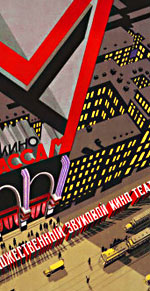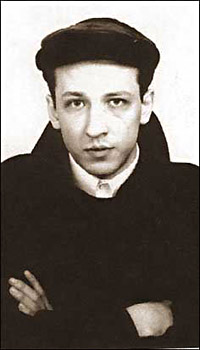
| Jacket 36 — Late 2008 | Jacket 36 Contents page | Jacket Homepage | Search Jacket |
This piece is about 5 printed pages long. It is copyright © Boris Ryzhii and Tom Dolack and Jacket magazine 2008. See our [»»] Copyright notice. The Internet address of this page is http://jacketmagazine.com/36/rus-ryzhii-trb-dolack.shtml

Back to the Russian poetry Contents list
Tell Me Right after Snowfall
Tell me right after snowfall —
Are we alive or have we been buried?
No, be silent for a while, I need not only words
on earth, in heaven, or in the grave.
The Lord did not grant me a roseate sea,
nor strength to get even with my enemies,
but the ability to weep from another’s sorrow,
loving, to smile at another’s happiness.
...Damp soldiers throw snowballs,
they are alone, alone in the whole world...
How pure is the snow, like angels — wingéd,
guilty of nothing, like children.
***
About what do the grey-haired stones remain silent?
For what reason are they deaf to the silence
of the earth? Their gravity is so close to me.
And as far as verse:
in verse silence is all the more important —
whether the rhymes are true or not.
What is a word? Only the expectation
of eloquent quietness.
Verse differs from prose
not only in being orphaned and diminutive.
Early in the morning with the palm of my warm hand
I dried tears from the stone.
***
Black angel on white snow,
reduced a hundredfold by a gloomy magician.
Death is sorrowful, but to live, I cannot.
In the bleak park no one is about.
In the bleak park there is always silence,
and a pine tree — like a stranger — stands.
Lean up against it, partake of the wine,
that lies — by the heart — in the pocket.
I made to recollect; but
at first it humiliated and then it killed.
It’s overly cold in this light coat.
The angel beats its black wings.
— Fly to your heaven, my dear,
and recount, as if god were still alive:
it’s still, he says, winter, still peaceful,
just some fool being lonely.
Farewell to My Youth
Just as in my youth, so in my childhood was I sick,
how I loved, not understanding love,
how elaborately I composed, how bitterly I sang,
admitting almost no verbal rhymes,
how I selected a rhythm, how I argued
with metaphors, in a kind of highly-strung style
I wrote all night, and come morning without strength
I went to school,
where I was a D student.
And everything seemed more complicated,
the closer to life, to death,
to men —
thus the days passed,
but, youth, you melted with the snow,
and it turned out that the world is painfully straightforward,
but something within me was forever smashed,
there remained something, be it a wasteland, or a burial ground,
but something forever remained within me.
So, admitting much with the mind,
there is much I do not admit with the soul,
so, having worn myself out in vain battle,
now I am barren and barrenly contemplate
discontiguous pieces of existence;
but piece by piece, I confess this sinful business,
most likely, I already possess
a painful conception of the entirety.
And forever with this conception
I must live, not being tormented, not suffering,
and listening to the water gurgle
in sleepless radiators, filling up,
bend to the snow-white sheet
in the unpeopled, nocturnal hours of day:
all this gloom, all this emptiness
I’ve mixed into myself, not having lost my common sense.
***
We were the last pioneers,
we weren’t members of the Komsomol.
We turned fourteen —
and took our ties off.
And became nobody: stars and snowflakes,
little sparks flying from cigarettes,
light kisses on the frost,
but no longer songs that rang
from the loud-speakers, especially on the 1st of May.
***
What can I say about marble–I am in love with ruins:
dusty, homely, strange paintings...
It’s true, I will not enumerate every epithet.
The thought that became the statue became thought anew.
Where does it — immortal, menacing — wander?
Where is the mournful artist who grasps it?
But someday — be it demon or bird–
it will turn into a hand, into a cold breast.
Perhaps, in sad lines, in warm, in sick,
endlessly clear ones, but utterly strange.
So that, as if from marble, you and I harden,
having read, we took offense, remembered, forgave.
Do not be sorrowful in the graveyard and do not weep, my friend;
twice is self-justification, three times is torture.
I drink to the death of Deniseva, I remember Troy,
I see a life that destroys itself right in front of me.
From Sverdlovsk with Love
The words of the all-Asian poet
will obtain the luster of all Europe,
I shall forget fairyland Sverdlovsk
and the schoolyard
in the district of the Vtorchermet factories.
But wherever it befalls me to cool over,
in sultry Paris
in dank London,
I advise burying my wretched ashes
in an anonymous graveyard
in Sverdlovsk.
Not in a scheme undeprived of beauty,
but in a precious and virtuosic pose,
since my fellow inmates are there,
their profiles of marble and rose.
On the vitriolic light-blue snows,
having completed the polytech with Cs,
they tripped up with copper in their skulls
like the first soldiers of perestroika.
Let Vtorchermet sound its trumpet.
Let the plypolymer whistle
largo.
And the woman who wasn’t with me,
will open her sketchbook and light up importantly.
She will open her light-blue sketchbook,
where our faces are warmed by the future,
where we are alive, in her light-blue sketchbook,
terrestrial trash: gangsters and poets.

Boris Ryzhii
Boris Ryzhii (b. 1974 Chelyabinsk) held a graduate degree in geology from the Ural Geophysics Institute. He was an editor for the journal Ural, and wrote a column about poetry for the Yekaterinburg paper the Book Club. He was awarded the Anti-Booker Prize (1999). In 2001 he committed suicide, since then his Collected Poetry 199–001 was published by the Pushkin Foundation.